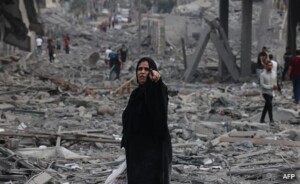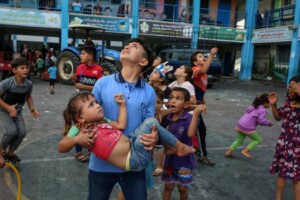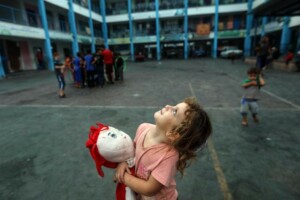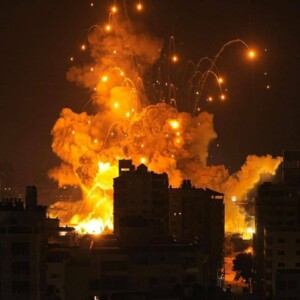We Communicate For Happy Children
 No Peace for Palestine's Children Without Justice, No Future for them Without Protection
No Peace for Palestine's Children Without Justice, No Future for them Without Protection 
No Peace for Palestine’s Children Without Justice, No Future for them Without Protection
The scorched-land policy and the suffocating blockade are a violation of the Convention on the Rights of the Child, and a war crime against children and their families in Gaza.

It is worth noting that while we were preparing this report a few days after the start of the war on Gaza, we had to repeatedly adjust the casualty numbers due to their continuous increase. Therefore, we would like to draw attention to the fact that this toll is not final, and it will have undoubtedly risen by the time you read the report.
2.2 million Palestinian refugees, 1.7 million are refugees since 1948, are crammed into a 41 kilometers by 10 kilometers area of 365 square kilometers.
A complete violation of the Convention on the Rights of the Child in all its provisions and a war crime against children and their families.
The Convention on the Rights of the Child stipulates protecting children and ensuring their lives, health, safety, education, freedom from torture, abuse, and violence anywhere in the world, regardless of their race, religion, nationality, or gender. This agreement is binding on the countries that have ratified it (including Israel), and they must enact laws and policies to ensure children’s rights, especially during times of war.
Considering Israel’s ratification of the Convention since 1991, it is legally bound and accountable to the international community for the full implementation of its provisions. This includes taking all practical measures to ensure the protection and care of children affected by armed conflicts, as stipulated in the fourth paragraph of Article 38. Israel is also obligated not to subject any child to torture or other forms of cruel, inhuman, or degrading treatment and not to deprive any child of their liberty in a legal or arbitrary manner, in accordance with paragraphs (a) and (b) of Article 37.
A Palestinian mother says, “My children in Gaza died hungry”.
What is happening in Gaza is collective punishment; starvation, targeting civilian and health infrastructure, depriving residents of electricity, and cutting off all sources of safe drinking water. At a time when more than a million people in Gaza and its children originally needed humanitarian assistance.
These violations and the imposition of a blockade on the people of Gaza and its women and children have prompted international organizations to raise their voices loudly, including UN Secretary-General Antonio Guterres, who announced that “operations must be carried out strictly in accordance with international humanitarian law.” Guterres emphasized that “civilian infrastructure should not be a target at all,” speaking about Israeli violations, including striking health facilities, residential towers, a mosque, and targeting an UNRWA school housing displaced families from Gaza.
In this context, the United Nations High Commissioner for Human Rights, Volker Türk, confirmed that “imposing a blockade puts the lives of civilians at risk by depriving them of basic living necessities, which is prohibited under international humanitarian law.”
Human Rights Watch described the statements of the Israeli Minister of Defense regarding the people of Gaza and their children, considering them as human-like animals, as disgusting and viewed them as incitement to commit war crimes. The director of the “Israel and Palestine Affairs” office at the organization, Omar Shaker, emphasized that depriving the people in Gaza of food and electricity constitutes collective punishment, adding that “this type of action is a war crime, just like using starvation as a weapon, and the International Criminal Court should take note of this call for the commission of a war crime.”
International Humanitarian Law Principles:
Violations of International Humanitarian Law in the Current War on Gaza:

Double standards
The people of Gaza have been living in the world’s largest open-air prison for 16 years.
and according to United Nations data, most of them are in urgent need of immediate humanitarian assistance, especially the children, many of whom have experienced seven consecutive wars.
During these years, the people of Gaza, including their children, have endured extremely tragic conditions due to the Israeli blockade that controls commercial crossings. This suffering extends to the healthcare sector, with shortages of equipment and medical staff, patients waiting for Israeli permits for surgeries abroad, as well as food and food security, and the education sector due to the severe lack of educational facilities and the ban on Gaza students traveling abroad for their studies. This has increased the number of those suffering from psychological trauma. According to United Nations data, there are 229,000 children in need of some form of care and psychological support.
All of this injustice and suffering over decades has not stirred the international community into action to help them.
It’s a clear and egregious double standard that the children of Gaza are subjected to.

A Call to Action:
Given the dire conditions facing the people and children of Gaza, the “Arab Network for Early Childhood” and the “Palestinian Network for Early Childhood” call on partners, donors, decision-makers, organizations, agencies, and governments to:
With each passing hour of the destructive war in Gaza, buildings and homes are being demolished, children and entire families are being killed or displaced, struggling to access food, water, medicine, and a safe shelter.
It is the time that we ensure all the rights of children around the world, starting with Gaza, are respected and upheld.

